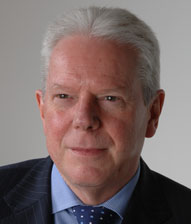We first met Corps Security Chief Executive Peter Webster, pictured, in the winter of 2010-11, three weeks into his time at the London-based company. Nearly five years later, Mark Rowe has made another return visit. More in the December 2015 print issue of Professional Security; but here ahead of the Remembrance time of year we feature what the Corps – formerly the Corps of Commissionaires, famously set up after the Crimean War to give work to war veterans, including amputees – is doing for the cause of returned servicemen.
Times change. In the boardroom upstairs at the Corps’ offices in Faringdon in central London, Peter plays an old black and white newsreel of a top-hatted King George V, and Queen Mary with a umbrella for the sun, reviewing in the sunshine rows of Corps uniformed men. You can find it on Youtube.
The Corps has a plot at the big Brookwood cemetery in Surrey. There stands a memorial to the founder of the Corps, Captain Sir Edward Walter; there rest past Commissionaires, including a Victoria Cross holder, men who served their country in wars. Peter points to Corps Security still having 55pc of colleagues who have served their country, ‘in one capacity of another’. Private security remains one of the natural places for armed forces people to transfer their skills in civilian life. Which brought Peter on to Combat Stress, the charity that Corps has taken on. Its work dates from after the 1914-18 war when men were first diagnosed as suffering from ‘shell shock’. We are living in a more enlightened time, as Peter says; psychological illness generally, and as a result of combat trauma, are more recognised than they were once. One finding by Combat Stress that Peter passes on is that the charity finds on average those returning from Iraq asked for help two and a half years after their service there; for Afghanistan, it was four and a half years. Why the difference, who knows, ‘but we must employ, and our industry must employ, people who are in that zone’. Perhaps you are looking at colleagues who are having problems. Someone who’s disruptive, or unreliable, might not realise that he’s suffering from PTSD (post-traumatic stress disorder).
Peter says: “And therefore we are going to train all our management in looking for the symptoms of PTSD.” As Peter adds, it’s not just those with PTSD, but their families, affected by the psychological injuries. Peter says he’ll be writing to colleagues at their home about Combat Stress, because if may be that men, being men, say and want to cope without asking for help; their wives may be the ones to offer the Combat Stress phone number to them.
Read more
Peter in his blog Corps Thinking has written about what he calls the ‘invisible impact’ of serving your country. Visit http://corpsthinking.com/.
About Combat Stress
It’s a Surrey-based veterans’ mental health charity. Visit http://www.combatstress.org.uk.









